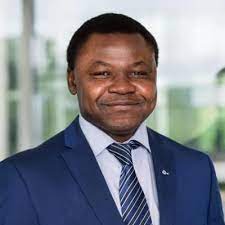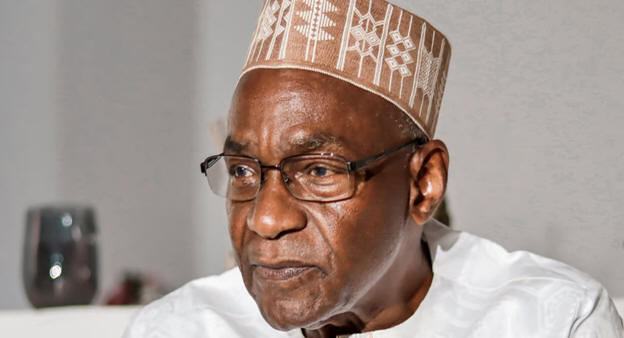www.aljazeerah.info
Opinion Editorials, October 2022
Archives
Mission & Name
Conflict Terminology
Editorials
Gaza Holocaust
Gulf War
Isdood
Islam
News
News Photos
Opinion Editorials
US Foreign Policy (Dr. El-Najjar's Articles)
www.aljazeerah.info
Chadian Prime Minister, Saleh Kebzabo, and the Twelve Labours of Hercules By Eric Topona Mocnga Le Chad Anthropus, Jeune Afrique, October 27, 2022 |
 |
 |
|
| Chadian Prime Minister, Saleh Kebzabo, October 2022 |
Saleh Kebzabo and the Twelve Labours of Hercules
As soon as appointed and already facing a major crisis after demonstrations were bloodily repressed... Coming from the ranks of the opposition, will the Prime Minister manage to make people forget the convulsions that have shaken the country since the death of Idriss Déby Itno?
Of all the Prime Ministers that Chad has known since its accession to independence in 1960, the head of the Government of National Accord of October 12, 2022, Saleh Kebzabo, is certainly the one who faces the most difficult political challenges. He has a Herculean charge, which the most skeptical observers consider a priori impossible to bear.
No state of grace
The new Prime Minister will not have known any state of grace, including during the probationary period of the first hundred days. History will remember that its very first Council of Ministers was held at the Pink Palace, while on 20 October, N'Djamena and other cities were the scene of harshly repressed demonstrations. This unexpected and dramatic crisis is in addition to previous convulsions. Saleh Kebzabo will have to succeed in a tour de force: to draw his roadmap in a strongly degraded socio-political climate.
This veteran politician, however, can boast of having the makings of the function. Thanks to his fine and in-depth knowledge of the state apparatus, as well as his practice of the establishment, he seems best placed to hold the rudder of the boat Chad, in these crucial moments when the latter has not emerged from the troubled waters in which he suddenly found himself after the tragic death of Marshal Idriss Déby Itno.
Difficult alchemy
Another glimmer of hope lies in the composition of the government, born of a complicated alchemy. First of all, the choice of a Prime Minister from a political side opposed to that of the Head of State is, in itself, a guarantee of openness. Despite the appointment to regal posts of some prominent figures of the Patriotic Salvation Movement (MPS, the former presidential party), equally prominent members of politico-armed groups have entered the government.
These include Tom Erdimi, of the Union of Resistance Forces (UFR, one of the three main rebel groups), who rose to the rank of Minister of State for Higher Education and Research; and Mahamat Assileck Halata, Vice-President of the Union of Forces for Democracy and Development (UFDD), signatory of the Doha Agreement, appointed Minister of Spatial Planning and Urban Development.
Dressing wounds
Given the expectations raised by his appointment, Saleh Kebzabo and his team must meet three major and urgent challenges, on a triple level: temporal, political and societal.
Temporally, his government must heal wounds, some of which date back to the early days of contemporary Chad. Given the complexity of the history and, above all, the political sociology of the country of Toumaï, this is far from being a sinecure.
During this same sequence, it is up to his team to organize, for the first time, free and transparent general elections, the verdict of which will be binding on all. This mission is all the more crucial because the constraints are both temporal and political. The organization of consensual elections is the sine qua non for the establishment of lasting peace in Chad.
However, the political history of contemporary Africa teaches us that governments of national unity resulting from peace agreements and formed after periods of belligerence have always collapsed when one of the parties to the agreements called into question the electoral process that followed them. The Angolan precedent, between Jonas Savimbi's Unita and José Eduardo dos Santos' MPLA, is just one illustration among many.
On the political level, Saleh Kebzabo must inscribe his action within the framework of the roadmap that the Head of State of the Transition has drawn at the end of the N'Djamena conference. This leaves the door of dialogue open to political parties and civil society actors who have opted for the empty chair policy.
The new Prime Minister must also consolidate the new socio-political architecture built at the end of the Doha negotiations and the Inclusive and Sovereign National Dialogue (DNIS).
Social cohesion
Finally, at the societal level, it is up to his government to strengthen social cohesion and create the conditions for true harmony. Indeed, the task to be tackled by the new Government team is that of building peace in the hearts of Chadians. In post-conflict periods, lasting peace is only possible if the people, in the diversity of their origins and political affiliations, take ownership of resolutions or recommendations taken at peace forums, such as that of the DNIS.
This eminent task will not, of course, depend solely on the Government of National Unity. All political parties, civil society actors who signed the Charter of the Transition, intellectuals and opinion makers will have to take part.
As the new team is responsible for conducting the DNIS's policy, it has the historic responsibility of creating the conditions essential for an appropriation of the new architecture of the State and the Nation, resulting from these foundations of the refoundation.
This is, without a doubt, one of the most important works of Hercules that falls to the new Prime Minister and his team today.
#TCHAD #Politique : Saleh Kebzabo and the twelve labours of Hercules - Le Tchadanthropus-tribune
***
Saleh Kebzabo named as Chad's new prime minister
DW, October 12, 2022
The ex-opposition politician and former journalist replaces Albert Pahimi Padacke, who was appointed after President Mahamat Idriss Deby seized power in the wake of his father's death.
Former journalist and opposition leader Saleh Kebzabo has been appointed prime minister of Chad, the military confirmed by decree on Wednesday.
The veteran politician was defeated in presidential elections on four occasions by Idriss Deby Itno, who ruled Chad for more than three decades until he was killed during a military operation in April 2021. He was then succeeded by a junta headed by his son, Mahamat, a 38-year-old five-star general.
Kebzabo replaces Albert Pahimi Padacke, a civilian politician who was named prime minister of a transitional military government last year after Mahamat Idriss Deby seized power.
Going back on promises
The junta had originally declared it would restore civilian rule after 18 months in power, and Deby had at first vowed not to participate in the proposed upcoming elections.
As the 18-month deadline neared, however, a nationwide forum staged by Deby meant the timeframe was altered.
Last weekend, the forum agreed the present government can remain in power until democratic elections in 2024.
In the meantime, Deby will remain the Central African country's "transitional president" and declared he could be a candidate in the elections in two years' time.
Peace agreement with rebels
In August, after more than five months of talks, 42 rebel groups signed an agreement with Chad's military government in the Qatari capital of Doha. The ceremony was attended by Mahamat Idriss Deby Itno, who promised not to relent in his efforts to obtain peace.
But several rebel groups, including the largest, Front for Change and Concord in Chad (FACT), have refused to sign the deal. Their absence has dented hopes for a quick peace deal and raised fears of a return to violence.
FACT is believed to be behind the death in combat of former president Idriss Deby.
jsi/nm (AFP, Reuters)
Saleh Kebzabo named as Chad's new prime minister – DW – 10/12/2022
***
Share the link of this article with your facebook friends
|
|
|
|
||
|
||||||


